|
|
|
Sort Order |
|
|
|
Items / Page
|
|
|
|
|
|
|
| Srl | Item |
| 1 |
ID:
108052
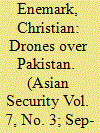

|
|
|
|
|
| Publication |
2011.
|
| Summary/Abstract |
The US government appears to be using drones to launch air strikes inside Pakistan. This article details uncertainties regarding the ethical soundness of these strikes and highlights the consequent need for greater official transparency. Available evidence is assessed in the light of traditional ethical requirements that the use of force is beneficial to a legitimate military objective, that it discriminates between combatants and noncombatants, and that it generates harm that is proportional to the expected military benefit. The murky picture that emerges is an inadequate foundation for determining whether US drone strikes in Pakistan constitute a just or an unjust use of force. Arguably, however, the very persistence of doubt on this point undermines international norms on the use of force and the reputation of the United States as a champion thereof. The US government should therefore either refrain from drone strikes or explain publicly how they are beneficial, discriminate, and proportionate.
|
|
|
|
|
|
|
|
|
|
|
|
|
|
|
|
| 2 |
ID:
132174
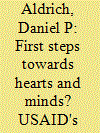

|
|
|
|
|
| Publication |
2014.
|
| Summary/Abstract |
The United States government has adopted new approaches to counter violent extremist organizations around the world. "Soft security" and development programs include focused educational training for groups vulnerable to terrorist recruitment, norm messaging through local radio programming, and job creation in rural communities. This article evaluates the effectiveness of one set of these multi-vectored, community-level programs through data from 200 respondents in two similar, neighboring towns in northern Mali, Africa. The data show that residents in Timbuktu who were exposed to the programming for up to five years displayed measurably altered civic behavior and listening patterns in comparison with their counterparts in the control town of Diré, which had no programming (controlling for potential covariates including age, ethnicity, and political and socioeconomic conditions). However, there was little measurable difference between the groups in terms of their cultural identities and attitudes towards the West. While this study is unable to definitively prove a causal connection between programming and behavioral outcomes, it nonetheless strongly suggests that the process of "winning hearts and minds" can be effective at certain levels but may require extended time and dedicated resources to generate higher-level results.
|
|
|
|
|
|
|
|
|
|
|
|
|
|
|
|
| 3 |
ID:
086174
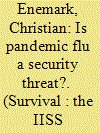

|
|
|
|
|
| Publication |
2009.
|
| Summary/Abstract |
Most infectious diseases do not attract heightened political attention because their effects are mild, they are familiar to physicians, or their geographic occurrence is limited. A particular disease might be deemed a security issue, however, when its effects impose or threaten to impose an intolerable burden on society. That burden can be measured in terms of morbidity and mortality, but also in terms of the way in which a disease is perceived by those who fear infection. The disease described by the World Health Organisation (WHO) as 'the most feared security threat' today is pandemic influenza.The next pandemic could cause illness and death on a large scale, over a wide area, in a short space of time. Such a prospect arguably sets this disease apart from the many others that may be regarded simply as health issues, and some Western governments have started to frame pandemic influenza as a threat to national security. According to the US pandemic plan, a 'necessary enabler of pandemic preparedness' is that this be viewed 'as a national security issue'. The 'National Security Strategy of the United Kingdom' assesses an influenza pandemic as the 'highest risk' civil emergency. And under the Australian pandemic plan, which emphasises 'maintenance of social functioning', Australians are to receive the best possible health care 'commensurate with the maintenance of a safe and secure society'.
|
|
|
|
|
|
|
|
|
|
|
|
|
|
|
|
| 4 |
ID:
134424
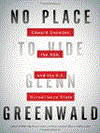

|
|
|
|
|
| Publication |
New York, Metropolitan Books, 2014.
|
| Description |
259p.Hbk
|
| Standard Number |
9781627790734
|
|
|
|
|
|
|
|
|
|
|
|
Copies: C:1/I:0,R:0,Q:0
Circulation
| Accession# | Call# | Current Location | Status | Policy | Location |
| 057924 | 323.44820973/GRE 057924 | Main | On Shelf | General | |
|
|
|
|
| 5 |
ID:
102436


|
|
|
|
|
| Publication |
2011.
|
| Summary/Abstract |
This article examines the impact of the utilisation of the RMA on the part of the Colombian and US governments vis-à-vis the Farc. The central argument is that the RMA as applied in Colombia relies on newfangled and sometimes clever conceptions of force that have weakened the relative power of the Farc, but which fail to address the root causes of insurgency in the country that centre on profound economic inequity and violent political exclusion. Over 75 per cent of the $6 billion so far divulged through Plan Colombia has been devoted to military and police assistance, with the rest going to institutional programmes and to a lesser extent to social programmes. Although the insurgents are indeed weaker, as a result both of the RMA as well as misguided policies on the part of the guerrillas themselves, they are by no means 'broken'. Violent conflict in the country will likely persist into the foreseeable future.
|
|
|
|
|
|
|
|
|
|
|
|
|
|
|
|
| 6 |
ID:
086148


|
|
|
|
|
| Publication |
2008.
|
| Summary/Abstract |
This investigation explores the ways in which discourses of security functioned to allow military intervention in Iraq to become 'thinkable', and how these actions serve to reconfigure not only the identities of states - the US and Iraq - but also the characteristics of the international as a spatial and conceptual domain. In the weeks preceding the military intervention in Iraq, significant negotiations were conducted between the US government and the UN that were commented on extensively in press statements and other documents released by both parties. Drawing on UNSC Resolutions, public debates and academic analyses, in this article I analyse the relations between the US and the UN in the build-up to the Iraq war, making two related claims.
First, I argue that each discourse is organised around a particular logic of security. By 'logics of security', I mean the ways in which various concepts are organised within specific discourses of security. That is, each competing conceptualisation of security has a distinct primary focus, referent object and perspective on the arrangement of the international system. The ways in which these claims are made, the assumptions that inform them, and the policy prescriptions that issue from them, are what I refer to as 'logics of security'. Second, I argue that the intervention in Iraq, a violence undertaken in the name of 'security', has functioned to reproduce the international as a spatial and conceptual domain according to the logic of a highly conventional narrative of sovereigneity, and, ultimately, of state identity.
|
|
|
|
|
|
|
|
|
|
|
|
|
|
|
|
| 7 |
ID:
109144
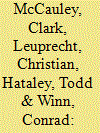

|
|
|
|
|
| Publication |
2011.
|
| Summary/Abstract |
A 2008 poll of 430 Ottawa Muslims found predominantly negative views of the U.S. war on terrorism, including the war in Iraq and the war in Afghanistan. This poll also assessed approval of Western powers (U.S., Canada, Israel, United Nations) and challengers of Western power (Al-Qaeda, Hamas, Hizballah, government of Iran). Surprisingly, attitudes of Ottawa Muslims toward militant Muslim groups were unrelated to their attitudes toward Western governments. Discussion suggests that this pattern, if confirmed in other Muslim polls, would mean that the war of ideas against radical Islam must address not one target but two: favorable opinions of militants and unfavorable opinions of the U.S. Muslims who come to like the West more may not like Muslim militants any less.
|
|
|
|
|
|
|
|
|
|
|
|
|
|
|
|
| 8 |
ID:
149298
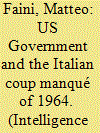

|
|
|
|
|
| Summary/Abstract |
In the summer of 1964, Italian security forces and the President of the Republic attempted to remove the US-backed Italian center-left government. The attempt did not succeed, but the threat to do so was used to curtail the government’s reformist program. This article shows that the State Department and the CIA misunderstood the plans of the Italian President and security officers, dismissing the possibility of a forceful removal of the center-left, despite having a long-standing hierarchical relationship with Italian intelligence. US officials failed because of poor analytic tradecraft and because of two unintended consequences of international intelligence hierarchies: an excessive reliance on liaison over penetrations and the increased freedom of maneuver of Italian intelligence when faced with multiple, competing principals.
|
|
|
|
|
|
|
|
|
|
|
|
|
|
|
|
|
|
|
|
|